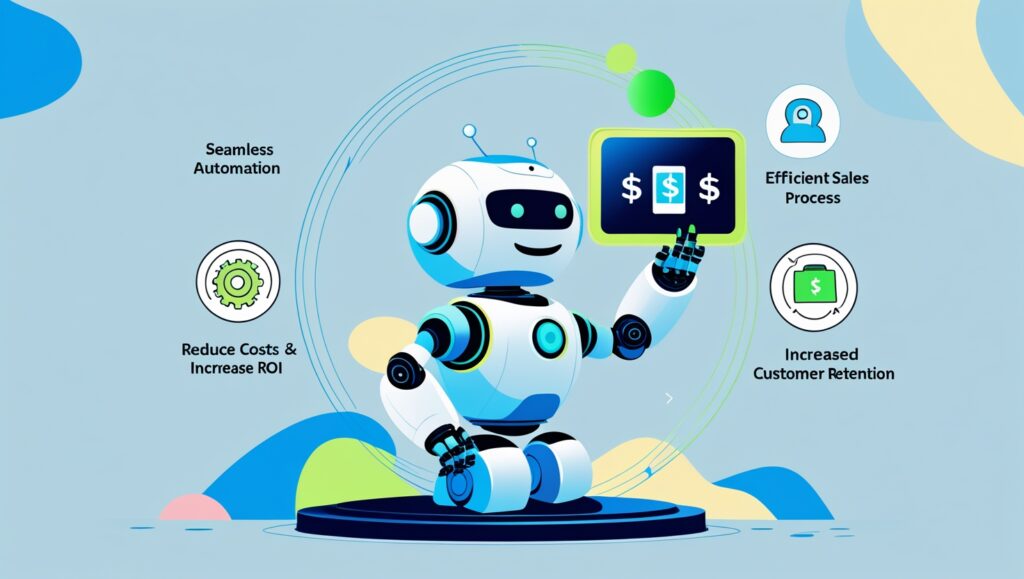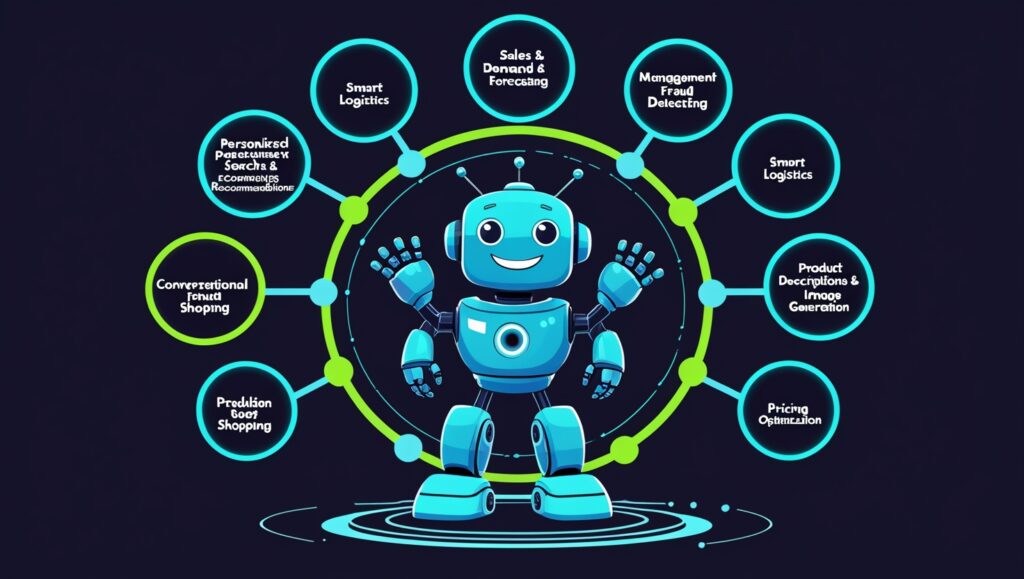click to get service View profile
Learn how to successfully implement AI in e-commerce to boost personalization, automate operations, and increase online sales. Discover tools, strategies, and best practices to future-proof your online business with AI.
As competition in online retail intensifies, brands must embrace innovation to stand out—and this is where AI in e-commerce becomes a game-changer. Artificial Intelligence is transforming every layer of the online shopping experience, from dynamic pricing and hyper-personalized marketing to real-time customer support and smart inventory management.
Implementing AI in e-commerce goes far beyond simply adding a chatbot or automating email campaigns. It’s about building a smart, data-driven ecosystem that continuously learns from customer behavior, anticipates market trends, and automates routine operations. This strategic integration empowers e-commerce businesses to make faster decisions, deliver hyper-personalized experiences, and scale efficiently—all while staying ahead in a highly competitive digital marketplace.
For e-commerce businesses of all sizes, the question is no longer if you should adopt AI, but how. In this blog, we’ll break down the practical steps to successfully implement AI in e-commerce, explore the benefits and challenges, and highlight tools and real-world examples to help you build a future-ready digital storefront.
Types of AI technologies for Ecommerce
There are many types of AI technologies used in e-commerce, each offering unique benefits and solutions for businesses:
1. Natural language processing (NLP)
Natural Language Processing (NLP) is a powerful component of AI in e-commerce that allows machines to understand, interpret, and respond to human language—both written and spoken. By enabling computers to process customer queries, reviews, and interactions in a human-like manner, NLP helps e-commerce platforms deliver smarter search results, personalized recommendations, and more natural chatbot conversations. This technology plays a key role in enhancing user experience and streamlining customer support in modern online shopping environments.
In e-commerce, NLP is applied in analyzing customer feedback for sentiment, enhancing site search to understand natural language queries and typos (e.g., “backpacks” for “backpacks”), and automating content moderation for platform integrity.
2. Generative AI
Generative AI is a cutting-edge branch of AI in e-commerce that enables machines to create original content such as product descriptions, images, audio, and even code—often with human-like quality. This technology is especially impactful in delivering personalized shopping experiences, automating creative tasks, and scaling content generation across e-commerce platforms. From AI-generated banners to tailored product recommendations, Generative AI empowers brands to engage customers more effectively and efficiently.
In e-commerce, this AI is utilized to write product descriptions, enhance chatbot performance, and create dynamic product visuals. As part of the agentic AI movement, some generative systems can even make autonomous content decisions based on user behavior.
3. Machine learning
Machine Learning (ML) is a core component of AI in e-commerce that empowers systems to identify patterns, analyze customer behavior, and make data-driven decisions—without being explicitly programmed. Instead of relying on static rules, ML algorithms continuously learn and adapt from user interactions, purchase history, and browsing data. This enables e-commerce businesses to offer personalized recommendations, optimize pricing strategies, detect fraud, and enhance the overall shopping experience with intelligent automation.
In e-commerce, ML drives personalized recommendations through customer behavior analysis and enables dynamic pricing with real-time market adjustments. It improves fraud detection by spotting unusual behavior in past data.
4. Deep learning
Deep Learning (DL) is an advanced subfield of AI in e-commerce, built on multi-layered neural networks that mimic the way the human brain processes information. By analyzing massive amounts of unstructured data—like product images, customer videos, and voice queries—deep learning models can detect intricate patterns and deliver highly accurate insights. This makes DL especially valuable in e-commerce applications such as visual search, voice-powered shopping, product tagging, fraud detection, and personalized customer experiences.
In the realm of AI in e-commerce, Deep Learning (DL) drives highly advanced recommendation systems by understanding the deeper semantic relationships between products, enabling more accurate and personalized suggestions for each shopper. DL also powers visual search functionality, allowing users to find products through images, and supports robust image and video recognition. This not only enhances the shopping experience but also streamlines product categorization and inventory management for greater operational efficiency.
Benefits of integrating AI in Ecommerce
Implement AI in eCommerce brings transformative benefits that reshape how businesses operate and engage with customers.

Here are the top benefits of AI in e-commerce that drive business growth:
- Seamless automation: AI automates repetitive tasks such as customer support via chatbots, inventory management, and order processing. This reduces errors, saves time, and allows businesses to focus on strategic growth initiatives.
- Efficient sales process: With AI-powered tools like smart product recommendations, dynamic pricing, and predictive analytics, the sales funnel becomes more streamlined. Customers find relevant products faster, and optimized pricing strategies increase conversion rates and average order value.
- Reduced costs and increased ROI: AI optimizes supply chain logistics, marketing campaigns, and fraud detection, lowering operational expenses. Precise targeting and better resource allocation lead to higher return on investment and sustainable profitability.
- Increased customer retention: AI processes user interaction patterns to generate personalized product offerings and content. It minimizes mistakes, improves efficiency, and lets businesses concentrate on long-term growth.
AI Use Cases in Ecommerce
Artificial intelligence is transforming every facet of e-commerce, offering innovative solutions that enhance AI in customer experience and optimize operations.

Here are the primary fields where AI is exerting considerable impact.
1. Personalized Product Searches and Recommendations
AI in e-commerce leverages vast amounts of customer data—such as browsing behavior, purchase history, and individual preferences—to deliver highly relevant product recommendations in real time. By accurately predicting what shoppers are most likely to be interested in, AI not only enhances the user experience but also unlocks powerful opportunities for upselling and cross-selling. This intelligent recommendation system drives higher conversions, increases average order value, and strengthens customer loyalty.
According to McKinsey’s Next in Personalization 2021 report, effective personalization can lead to a remarkable 40% increase in revenue.
2. Pricing Optimization
Given its advanced algorithms, AI also empowers e-commerce businesses to adjust product prices in response to market conditions. AI is capable of evaluating real-time variables such as competitor prices, production expenses, stock availability, and consumer demand to make well-informed pricing choices.
AI in e-commerce enables dynamic pricing strategies by continuously analyzing demand, competition, inventory levels, and customer behavior to predict and set optimal price points. This data-driven precision helps businesses avoid stockouts, reduce overstock, and maximize revenue from every sale. By adapting prices in real time, e-commerce brands can boost profitability, stay competitive, and respond swiftly to market changes—delivering both business efficiency and customer value.
3. Conversational Shopping
AI in e-commerce is revolutionizing the online shopping experience by making customer interactions more natural, intuitive, and efficient. AI-powered chatbots and virtual assistants are now widely adopted across e-commerce platforms, capable of understanding complex queries, processing both text and image inputs, and delivering instant, personalized responses. These intelligent tools offer 24/7 support, enhancing customer satisfaction while reducing response times. By handling routine inquiries, they free up human support teams to focus on high-value, complex customer issues—driving both operational efficiency and better user experiences.
Additionally, by offering personalized product recommendations and real-time updates, Conversational AI in Ecommerce enhances user experience and streamlines the purchasing journey.
4. Product Descriptions and Image Generation
Generative AI in e-commerce streamlines content creation for businesses by producing unique, keyword-rich product descriptions. This not only saves time but also improves SEO, supports feed-based advertising, and helps customers make informed purchase decisions.
For visual content, AI speeds up product image creation by enabling background changes, new settings, and lifestyle visuals. It assists designers with large-scale edits and fine-tuning, ensuring consistent, high-quality images that can be easily scaled across all product listings.
5. Sales and Demand Forecasting
AI-driven forecasting combines historical data, customer insights, and real-world conditions (like weather or market changes) to predict sales and demand more precisely.
AI in e-commerce empowers businesses with accurate, real-time demand forecasting, enabling them to minimize stockouts, reduce excess inventory, and optimize supply chain operations. By continuously analyzing data and updating predictions, AI allows companies to respond swiftly to market shifts—ensuring that high-demand products remain available. This predictive precision also supports dynamic pricing strategies and more effective, targeted marketing efforts, ultimately lowering costs and enhancing both efficiency and customer satisfaction.
6. Smart Logistics
AI in e-commerce plays a critical role in enabling smart logistics, optimizing every stage of the supply chain—from warehouse management to last-mile delivery. By analyzing real-time data on inventory levels, transit routes, and external factors such as weather or traffic conditions, AI helps streamline logistics operations and improve overall supply chain accuracy. This intelligence allows for automated decision-making and flexible adjustments, ensuring faster deliveries, reduced operational costs, and a more responsive logistics network.
AI helps reduce operational costs and minimize waste through better resource use and smoother workflows. It also speeds up delivery times and improves reliability, which boosts customer satisfaction and strengthens overall supply chain responsiveness.
7. Risk management and fraud detection
AI in e-commerce enhances fraud detection by analyzing historical data and monitoring real-time user activity to identify suspicious patterns. Advanced AI models evaluate multiple signals—such as transaction history, browsing behavior, payment methods, and device fingerprints—to detect unusual or high-risk actions. This proactive approach helps e-commerce businesses prevent fraudulent transactions, protect customer data, and maintain trust, all while minimizing false positives and manual review efforts.
This intelligent approach to AI in e-commerce helps businesses significantly reduce financial losses and safeguard customer trust, all while ensuring a smooth experience for legitimate users. By continuously adapting to emerging fraud techniques, AI systems improve detection accuracy, minimize false positives, and automate transaction reviews. The result is a more secure, efficient, and seamless operation that enhances both customer satisfaction and overall business performance.
You may want to read more: Choosing the Right AI Agent Frameworks for Your Project
Final thoughts
Implementing AI in e-commerce isn’t just a trend—it’s a strategic move toward smarter, more scalable online business operations. From personalized recommendations and intelligent search to fraud detection and dynamic pricing, AI is transformi ng every touchpoint of the customer journey.
But successful adoption requires more than technology alone. It demands the right data, clear objectives, and a mindset geared toward continuous improvement. Whether you’re just getting started or looking to deepen your AI integration, now is the time to act.
By embracing AI in e-commerce thoughtfully and strategically, businesses can enhance customer experiences, streamline operations, and gain a lasting competitive edge in an increasingly digital world.

